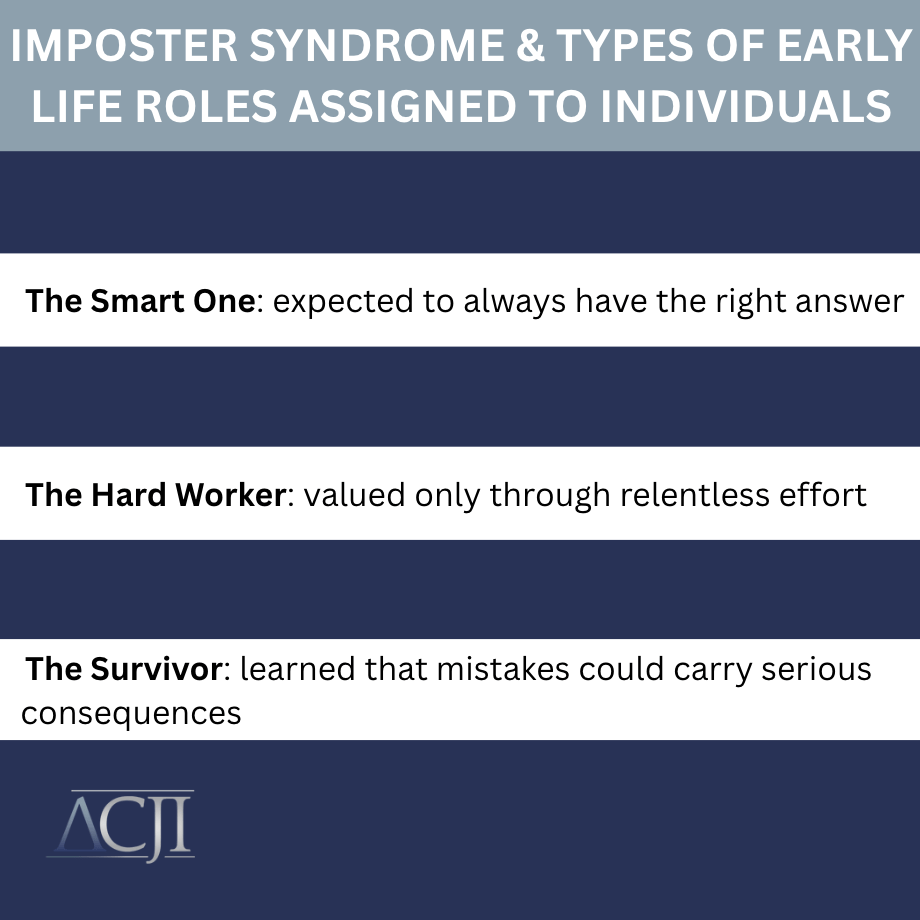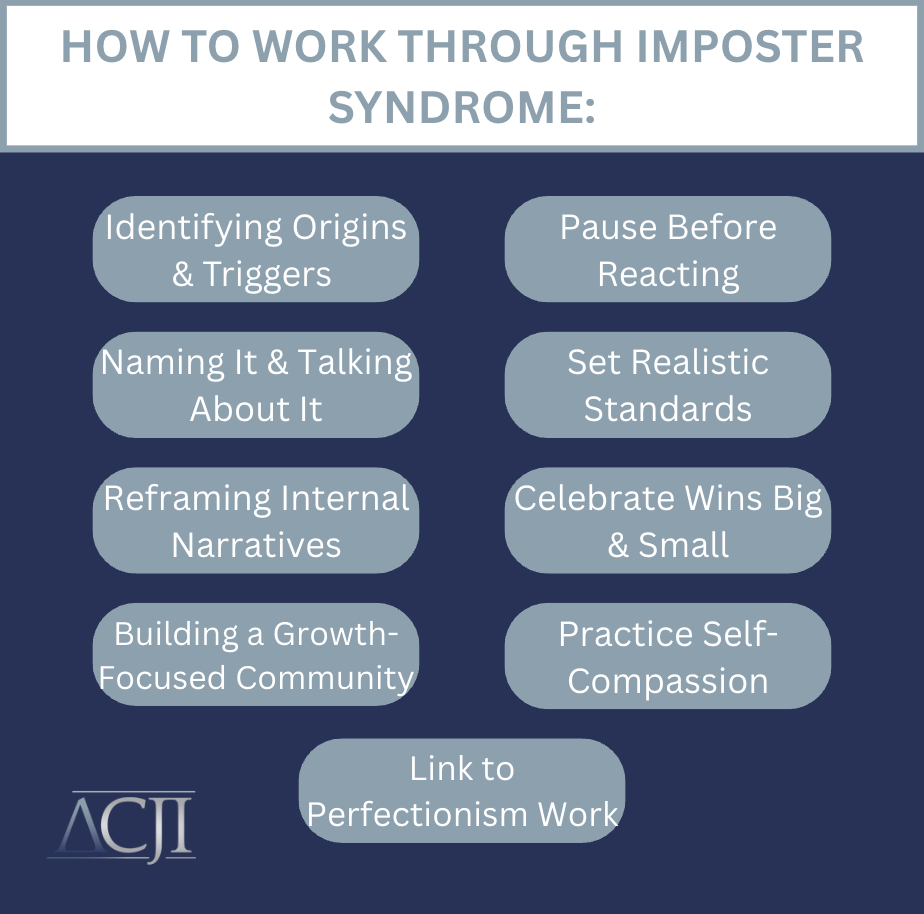Shining a Light on Imposter Syndrome
From Self-Doubt to Self-Trust
How is it that even the most accomplished leaders sometimes ask themselves, “Who am I to be here?” Since the late 1970s, psychologists have called this Imposter Syndrome, a persistent belief that your success isn’t truly earned, paired with the fear that one misstep will expose you as unworthy.
Those with experience and expertise, advancing progress in the most critical spaces, can feel the weight of Imposter Syndrome. Recognizing its roots, understanding how it manifests, and applying strategies to counter the syndrome will strengthen the resilient and confident mentality required to lead teams and live better in complex times.
What Imposter Syndrome Really Is (and Isn't)
Imposter Syndrome isn’t a mental health diagnosis, and it doesn’t appear in the Diagnostic and Statistical Manual of Mental Disorders (DSM). Instead, it’s a pattern shaped by personal history, workplace culture, and societal expectations. About 70% of people across cultures, genders, and career stages experience it at some point.

At its core, Imposter Syndrome is the persistent belief that you’re somehow deceiving others about your abilities, despite clear evidence of your competence. In the moment, it can feel deeply uncomfortable, even paralyzing. And here’s the catch: it’s not tied to actual performance, achievements, or success. You can be thriving in every measurable way and still be stuck in intense self-criticism.
As Maya Angelou once admitted: “I’ve written 11 books, but each time, I think uh-oh, they’re going to find out now. I’ve run a game on everyone, and they’re going to find me out.”
Where Imposter Syndrome Comes From
Imposter Syndrome takes root in early life experiences and the roles assigned to individuals growing up, such as:
- The Smart One is expected to always have the right answer
- The Hard Worker is valued only through relentless effort
- The Survivor learned that mistakes could carry serious consequences

The stories we learn early in life follow us into our careers. Many people explain their success as the result of luck, a mistake, helpful connections, or simply working themselves to exhaustion, while taking failure as proof that they are the failure. Research by Brené Brown shows that the top shame trigger at work is the fear of being irrelevant, a pressure that fuels and intensifies this cycle.
How Imposter Syndrome Shows Up
Many people feel capable in some areas and deeply uncertain in others. Imposter Syndrome shows up in specific situations or familiar environments, and it can exist right alongside confidence. During a presentation, for example, an audience might see poise and composure, while the speaker is silently wrestling with anxiety and self-doubt.
Research shows women and men report Imposter Syndrome at similar rates, but they respond differently. Women are more likely to lean into the challenge and confront it, which can make the experience more visible and inflate statistics. Men, on the other hand, may avoid the triggering situation altogether and still succeed, adding a systemic layer to how Imposter Syndrome plays out.
The Hidden Costs
Left unaddressed, Imposter Syndrome can lead to:
- Avoiding growth opportunities – turning down promotions, projects, or public speaking roles to avoid scrutiny.
- Fear of being “found out” – persistent worry about being exposed as incompetent, even when performing well.
- Overwork and over-preparation – working excessively to prove worth or justify your place.
- Perfectionism and procrastination – delaying the completion of work for fear it won’t meet impossibly high standards.
- Chronic stress and burnout – sustained pressure that undermines health and energy.
- Compassion Fatigue – driving overwork, self-criticism, and the constant need to “prove” worth.
- Reduced career satisfaction – feeling unfulfilled or disconnected despite outward markers of success.
- Isolation at work – withdrawing from colleagues to avoid vulnerability or perceived judgment.
- Limited idea sharing and creativity – withholding contributions, which reduces team innovation.
- Lower risk-taking – avoiding calculated risks that could lead to advancement or breakthrough ideas.
- Reduced leadership capacity – hesitating to mentor, delegate, or advocate for yourself and others.
How to Work Through Imposter Syndrome
Research and leadership practice suggest that Imposter Syndrome can be addressed by:
- Identifying origins and triggers – reflect on early experiences, workplace dynamics, and situations that activate self-doubt.
- Naming it and talking about it – share openly with trusted peers, mentors, or coaches to break the secrecy that fuels shame.
- Reframing internal narratives – challenge automatic negative thoughts, replacing them with balanced, evidence-based perspectives.
- Building a growth-focused community – surround yourself with colleagues who support mutual learning, encouragement, and constructive feedback.
- Pause before reacting – when triggered, take a beat to ground yourself, allowing for more intentional and confident responses.
- Set realistic standards – recognize perfectionism patterns and replace them with achievable, flexible goals.
- Celebrate wins big and small – actively track and acknowledge accomplishments to help internalize success.
- Practice self-compassion – treat yourself with the same empathy and fairness you’d offer a colleague.
- Link to perfectionism work – address perfectionism directly, as it reinforces Imposter Syndrome cycles.

Imposter Syndrome and Perfectionism Reinforce Each Other
Perfectionism dictates that mistakes are unacceptable; Imposter Syndrome insists that you do not deserve to be in the role in the first place. Together, they create a cycle of risk avoidance, overwork, and dependence on external validation.
Healthy striving is the alternative. Instead of perfectionism, focus on pursuing excellence because it aligns with values, embracing learning as part of growth, and allowing space for rest and recovery.
In Conclusion
Self-doubt does not prove inadequacy; it reflects deep commitment to meaningful work. By understanding Imposter Syndrome, leaders and teams normalize these experiences, create environments that value vulnerability, and build the internal resilience necessary for psychological safety, high-performing teams, and greater career satisfaction.
ACJI provides training, coaching, and resources that help leaders and organizations confront the patterns that hold them back, including Imposter Syndrome, and replace them with strategies that promote effective, values-driven action.





